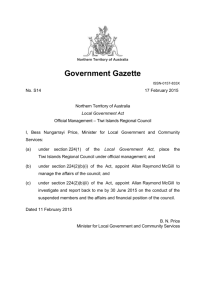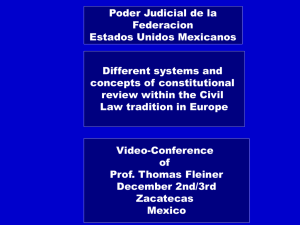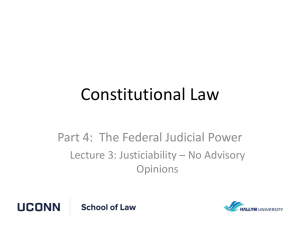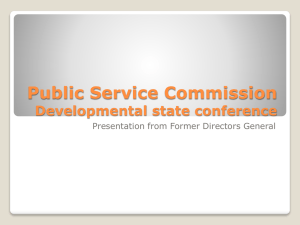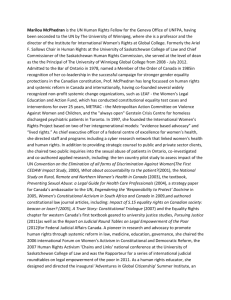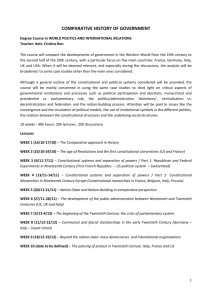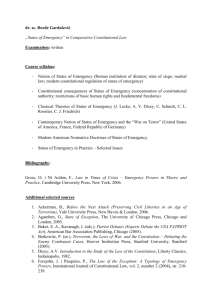RTF format
advertisement
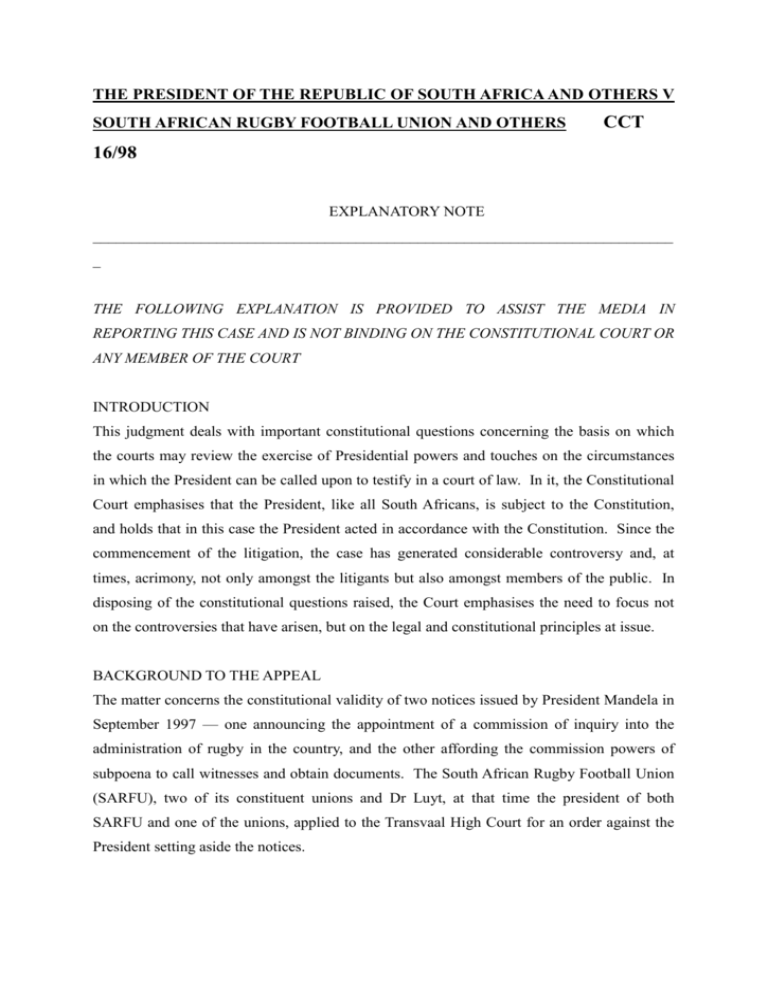
THE PRESIDENT OF THE REPUBLIC OF SOUTH AFRICA AND OTHERS V SOUTH AFRICAN RUGBY FOOTBALL UNION AND OTHERS CCT 16/98 EXPLANATORY NOTE ___________________________________________________________________________ _ THE FOLLOWING EXPLANATION IS PROVIDED TO ASSIST THE MEDIA IN REPORTING THIS CASE AND IS NOT BINDING ON THE CONSTITUTIONAL COURT OR ANY MEMBER OF THE COURT INTRODUCTION This judgment deals with important constitutional questions concerning the basis on which the courts may review the exercise of Presidential powers and touches on the circumstances in which the President can be called upon to testify in a court of law. In it, the Constitutional Court emphasises that the President, like all South Africans, is subject to the Constitution, and holds that in this case the President acted in accordance with the Constitution. Since the commencement of the litigation, the case has generated considerable controversy and, at times, acrimony, not only amongst the litigants but also amongst members of the public. In disposing of the constitutional questions raised, the Court emphasises the need to focus not on the controversies that have arisen, but on the legal and constitutional principles at issue. BACKGROUND TO THE APPEAL The matter concerns the constitutional validity of two notices issued by President Mandela in September 1997 — one announcing the appointment of a commission of inquiry into the administration of rugby in the country, and the other affording the commission powers of subpoena to call witnesses and obtain documents. The South African Rugby Football Union (SARFU), two of its constituent unions and Dr Luyt, at that time the president of both SARFU and one of the unions, applied to the Transvaal High Court for an order against the President setting aside the notices. During the hearing before De Villiers J in the High Court, Dr Luyt and several SARFU officials, as well as President Mandela, Mr Tshwete (then Minister of Sport and Recreation) and other witnesses gave oral evidence. In a judgment running to 1159 pages, the High Court held that the notices should be set aside on three grounds. 1. The Judge held that the President had abdicated his power to appoint the commission to the Minister at a meeting in August 1997 and that such abdication was irrevocable. The Judge’s conclusion was therefore that the President had not taken the decision to appoint the commission himself as the Constitution requires him to do. The President and the Minister denied that such an abdication had taken place in August, and the President, in his written and oral evidence, stated that in the ten days prior to the appointment of the commission in September 1997 he had carefully considered the memorandum given to him by the Minister in support of the Minister’s request that a commission be appointed. The Judge held that the President’s evidence in relation to his consideration of the question of whether a commission should be appointed in September was irrelevant as the abdication in August 1997 had been irrevocable and he made an adverse credibility finding against the President. 2. The Judge held that SARFU should have been afforded a hearing prior to the President’s decision to appoint the commission. 3. The Judge held that the President had not properly applied his mind to the appointment of the commission. The President, the Minister and the Director-General in the Department of Sport and Recreation, appealed to this Court against the High Court’s order. They submitted that all three grounds upon which the High Court had set aside the presidential notices were incorrect. At the hearing of the appeal only Dr. Luyt and the Gauteng Lions Rugby Union defended the order. JUDGMENT OF THE CONSTITUTIONAL COURT In its judgment, the Constitutional Court reviews the law and evidence extensively and decides that the appeal must be upheld. It identifies key errors of law and fact in the judgment of the High Court. The main findings of the court are the following: 1. The High Court’s conclusion that the President had irrevocably abdicated his responsibility to the Minister is flawed in two respects. First, such an abdication, if it took place, would be invalid, and could therefore never be irrevocable. Secondly, the Court finds that the evidence does not support a conclusion that such an abdication took place. The Court reviews the evidence relating to the President’s consideration of the question of whether a commission should be appointed (in the period before the appointment in September 1997) and concludes that the evidence makes it clear that the President had applied his mind properly to the question. In order to determine whether the President considered the matter properly before appointing the commission, it is necessary for the Court to determine whether the adverse credibility finding made against the President was correct. The Court holds that the adverse credibility finding against the President was not substantiated on the evidence. It also finds that it was never put to the President during his testimony, either by SARFU’s lawyers or by the Judge, that his evidence relating to his consideration of the appointment of the commission was false. 2. The President was not obliged to give SARFU a hearing before deciding to appoint the Commission. His decision to appoint the commission did not constitute “administrative action” as contemplated by section 33 of the Constitution. The Court holds, however, that there are clear constitutional constraints on the exercise of the President’s power, but that these were not breached in the present case. 3. The subject matter to be investigated by the commission constitutes a matter of public concern as required by the Commissions Act. The Court also holds that the terms of reference of the commission were sufficiently certain to determine the ambit of the commission’s investigation. 4. The decision to require the President to give oral evidence before the High Court was flawed. The Court makes it clear that compelling a President to give oral evidence in a civil case concerning the performance of his official duties is an extraordinary order for a court to make and observes that the parties’ legal representatives were themselves unable to point to a case in which this has ever happened in another jurisdiction or in South Africa. The President, although subject to the Constitution, is not in the same position as any other witness. There are two competing principles to be considered. First, the doctrine of separation of powers requires courts to seek to protect the status, dignity and efficiency of the office of the President. Secondly, the courts must seek to protect and promote the administration of justice. The President may be compelled to give oral evidence in open court only in the most exceptional circumstances when the prejudice to the administration of justice clearly outweighs the prejudice to the office of the President. 5. Lawyers on behalf of the President and the other appellants had submitted that the handling of the case in the High Court was such as to give rise to a reasonable apprehension of bias on the part of De Villiers J. The Court holds that it is not necessary to consider this submission. 6. Lawyers for the appellants also argued that a special order of costs on an attorney and client basis should be made against the two respondents. They submitted that the respondents had engaged in a campaign to discredit the judgment of this Court, once they realised that their prospects of upholding the High Court’s judgment were poor. That campaign had, according to the appellants, included the launching of an application calling for the recusal of five judges of the Court as well as the unexplained withdrawal of respondents’ legal representatives from court before the close of argument. The Court holds that if proof of such a campaign had been established, such a special costs order would have been made. However, it holds that on the facts of the case, it is not able to establish with sufficient certainty that such a campaign had been undertaken by the respondents and therefore makes no special order as to costs. 10 September 1999

